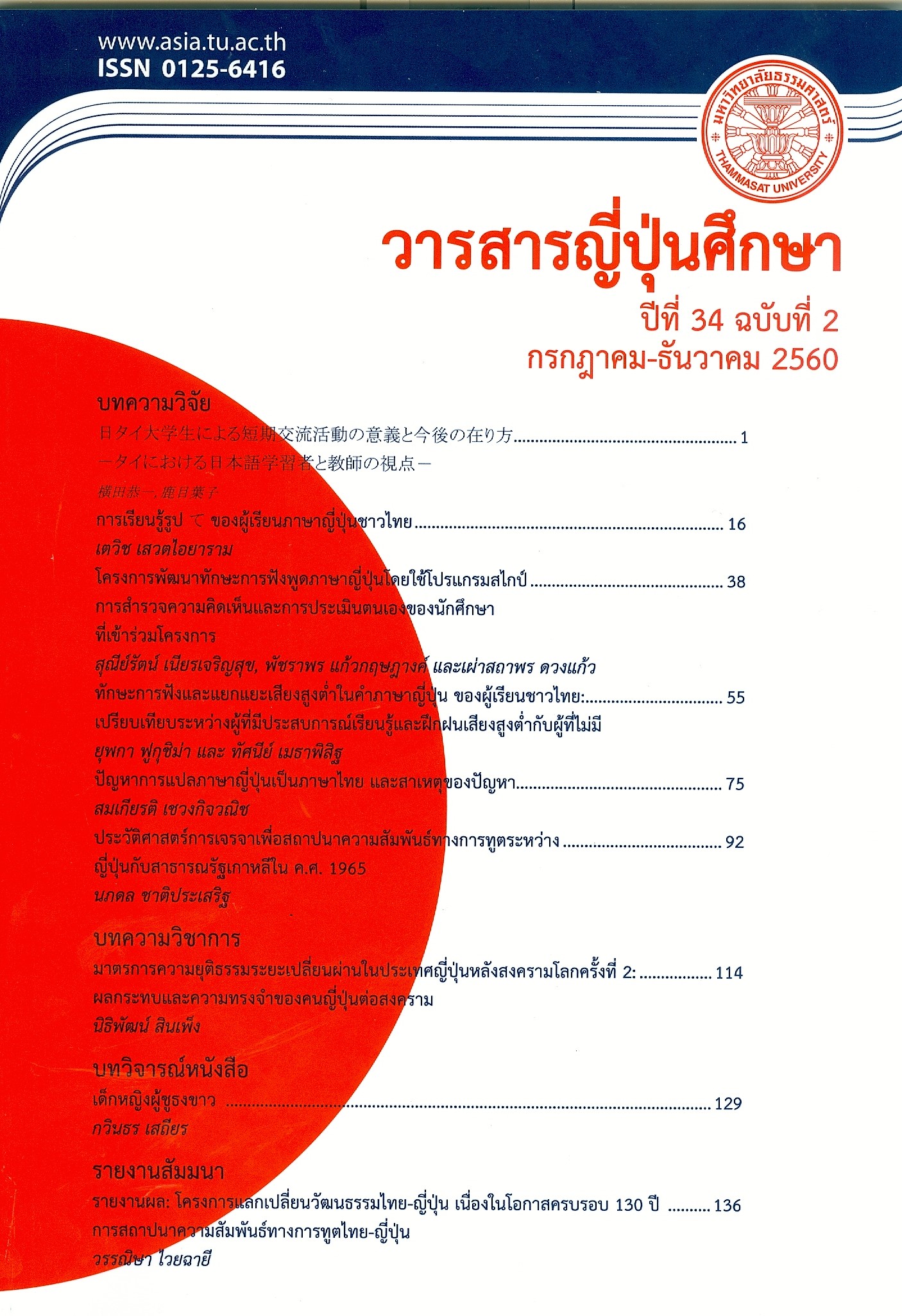ทักษะการฟังและแยกแยะเสียงสูงต่ำในคำภาษาญี่ปุ่นของผู้เรียนชาวไทย: เปรียบเทียบระหว่างผู้ที่มีประสบการณ์เรียนรู้และฝึกฝนเสียงสูงต่ำกับผู้ที่ไม่มี
คำสำคัญ:
ทักษะการฟัง, การแยะแยะเสียงสูงต่ำ, ความรู้เกี่ยวกับการออกเสียงบทคัดย่อ
งานวิจัยนี้มีวัตถุประสงค์ 2 ข้อ คือ 1. เพื่อวิเคราะห์ปัญหาการฟังเสียงสูงต่ำภาษาญี่ปุ่นของผู้เรียนชาวไทย และ 2. เพื่อวิเคราะห์ว่าความรู้ ความเข้าใจ และประสบการณ์การฝึกฝนเสียงสูงต่ำช่วยกระตุ้นการเรียนรู้เสียงสูงต่ำมากน้อยเพียงใด โดยใช้แบบทดสอบการฟังเสียงสูงต่ำที่ดัดแปลงจาก “แบบทดสอบการฟังเสียงสูงต่ำภาษาโตเกียว” ซึ่งพัฒนาโดย 河津他(2003) กลุ่มเป้าหมายได้แก่นิสิตสาขาวิชาภาษาญี่ปุ่นชั้นปีที่ 1 คณะมนุษยศาสตร์ มหาวิทยาลัยเกษตรศาสตร์ จำนวน 74 คน โดยมุ่งศึกษาเปรียบเทียบความแตกต่างระหว่างผู้ที่มีประสบการณ์เรียนรู้และฝึกฝนเสียงสูงต่ำกับผู้ที่ไม่มี ผลการศึกษาสามารถสรุปได้ดังนี้
1. ผู้เรียนชาวไทยมีแนวโน้มที่จะฟังเสียงสูงต่ำคำศัพท์ที่จบด้วยทำนองเสียงบอกเล่าได้ดีกว่าคำศัพท์ที่ จบด้วยทำนองเสียงคำถาม
2. อัตราความถูกต้องของการฟังรูปแบบเสียงสูงต่ำมีแนวโน้มลดลงผกผันกับจำ นวนพยางค์ที่เพิ่มขึ้น
3. รูปแบบเสียงสูงต่ำที่มีอัตราความถูกต้องของการฟังต่ำสุดคือแบบลบสอง (คำซ้ำ ที่มีตำแหน่งเสียงสูงต่ำ
อยู่พยางค์ที่สองนับจากท้ายคำ ) ในคำ 4-5 พยางค์ โดยเฉพาะอย่างยิ่งเมื่อลงท้ายด้วยทำนองเสียงต่ำ ถาม
4. ความรู้ความเข้าใจ และประสบการณ์การฝึกฝนเสียงสูงต่ำ ช่วยส่งเสริมให้ผู้เรียนมีทักษะการฟัง และสามารถแยกแยะเสียงสูงต่ำภาษาญี่ปุ่นได้ถูกต้องมากขึ้น โดยเฉพาะแบบราบ แบบสูงที่พยางค์ต้น และแบบสูงที่ พยางค์กลาง (ยกเว้นแบบลบสอง) ของคำศัพท์ที่จบด้วยทำนองเสียงบอกเล่า ซึ่งมีอัตราความถูกต้องของการฟังโดยเฉลี่ยมากกว่าร้อยละ 80




